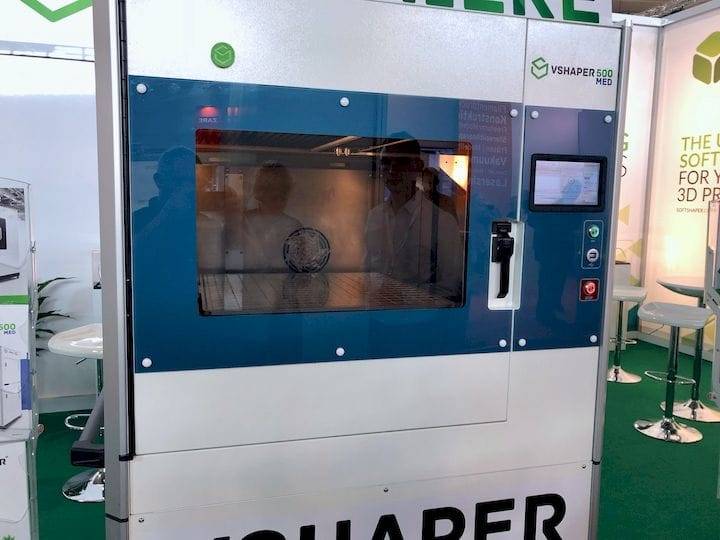[ihc-hide-content ihc_mb_type=”show” ihc_mb_who=”reg” ihc_mb_template=”3″ ]
[vc_row][vc_column][vc_column_text]Credits – www.fabbaloo.com
Their VSHAPER 500 3D printer has been around a while and the new 500 MED is based on that same platform, but with several highly unusual additional features that enable the machine to perform work previously challenging in medical environments.
The VSHAPER 500 MED, like the 500 unit, is a high-temperature machine. It includes dual swappable nozzles that can move out of the way to prevent accidental collisions during printing.[/vc_column_text][vc_single_image image=”4920″ img_size=”full” add_caption=”yes” alignment=”center”][vc_column_text]But what makes the VSHAPER 500 MED medically-capable? It seems that prints emerging from this device are in fact sterilized!
This is accomplished by using powerful UV lighting within the build chamber. Thus, as each layer is laid down, it is illuminated and any stray bacteria are toasted.
As well, other components within the VSHAPER 500 MED are coated with an anti-bacterial silver powder to dramatically reduce the bacterial count within the chamber.
Another very unusual feature is the air filtration system on the VSHAPER 500 MED. While some 3D printers filter outbound air to remove nanoparticle and VOC emissions, which the VSHAPER 500 MED does, this machine also filters INBOUND air!
The reason for this is to again reduce the bacterial count within the build chamber. The input filter removes as much as possible.[/vc_column_text][vc_single_image image=”4919″ img_size=”full” add_caption=”yes” alignment=”center”][vc_column_text]The result of all this effort is the ability to 3D print objects that are essentially bacteria-free. This means it is possible to safely 3D print objects that could be implanted into human patients. Typically this is done with PEEK material on the VSHAPER 500 MED, which, by the way, is a high-temperature-capable device.
VSHAPER has been working with several institutions to test the device, and apparently several implants have already been accomplished by the University of Warsaw using the VSHAPER 500 MED.
I’ve heard of food-safe 3D printers, and anti-bacterial filament, but have never seen a “medical” 3D printer of this type before. I’m wondering what size of a market this may be. It could be large, considering the number of implants done worldwide.
Typically today 3D printed implants are done using highly certified metal 3D printers. But this means the cost of the implant parts will be significant – in some cases the metal powder costs as much as US$500 per kg. The cost of thermoplastic implants might be less and more accessible as well.
It should be interesting to see how successful VSHAPER is in this market, and whether other 3D printing companies follow their lead.[/vc_column_text][/vc_column][/vc_row]
[/ihc-hide-content]


